#spring in the Crimea
Explore tagged Tumblr posts
Text
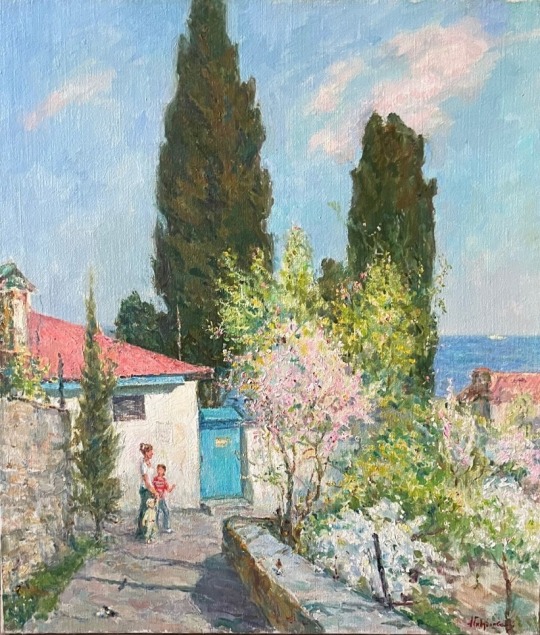
"Spring in Crimea" by Albin Gavdzinsky (1990s)
101 notes
·
View notes
Text
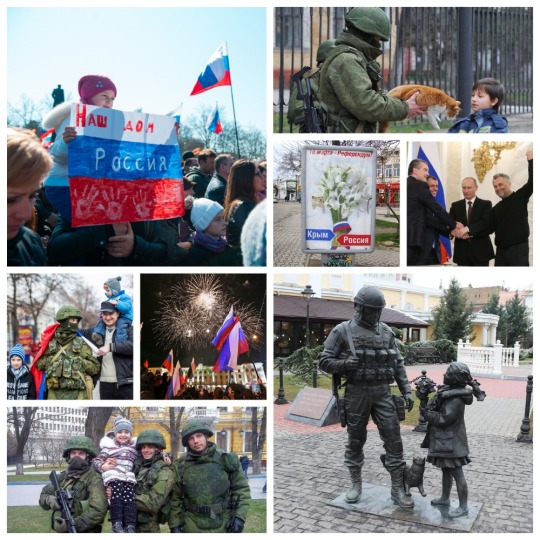
🌹🇷🇺Десять лет со дня, когда в Россию пришла весна. И вежливость взяла города🇷🇺🌹
4 notes
·
View notes
Text
24.02.2022.
The day that changed my life forever.
24th of February 2022 should have been my usual day. No, not usual. A wonderful day. I should have been checked with a doctor, gave notice to teachers in high school of my absence, and then fly away on vacation, my parents wanted it so much.
On 23rd of February 2022 I felt happy. I had a secure, happy life, preparing to finals, hanging out with my friends, already having an offer from university.
Until 5AM 24.02.2022.
I had not a single class in my school since then.
I haven’t seen my friend group in 2 years.
I didn’t have my finals.
We did not have that vacation.
“Daughter, wake up. This old psychotic man attacked us. We are leaving.”
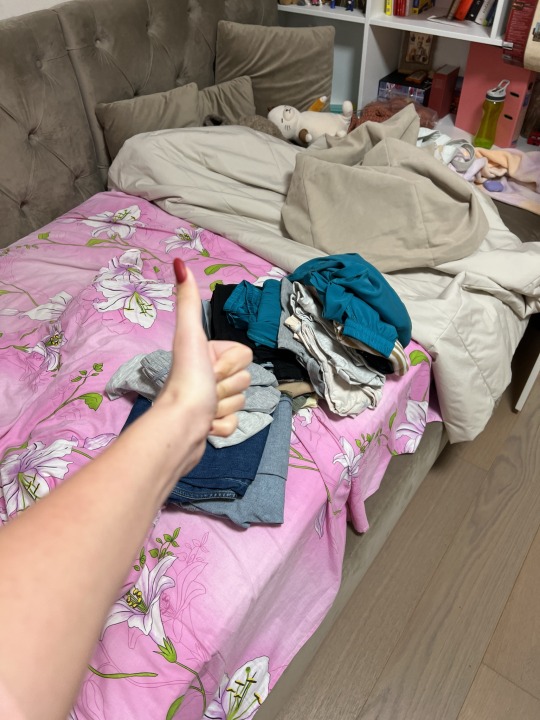
That was my first photo of the day, trying sarcastically keep myself normal. I remember that actual emptiness, reading my classmates texts about how their windows were shaking because of explosions, the sky was orange. They sent that video.
He called it “a special military operation”.
I collected random clothes, some hobby stuff just to keep my sanity, grabbed my pet, emptied my safety locker. I was scared that russians would intrude into our home and steal all my savings, so I throw away key to that lock. This key became my symbol of war, I have never found it even after return.
When I with my parents and pet got out of flat to car we heard for the very first time air raid siren. We would hear so many more of them, we would learn to differentiate them, but then we were confused.
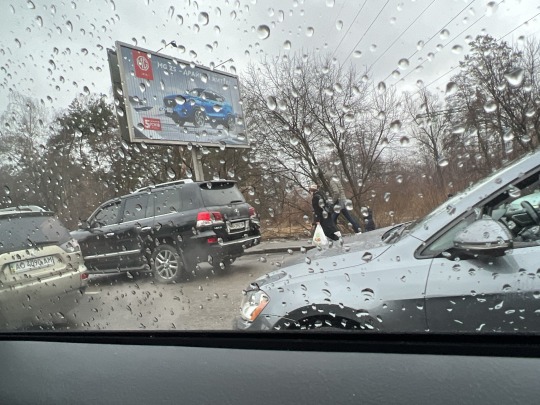
It was my second photo. People were going away. Foot, cars, bicycles. I remember such a surreal picture. Some moms were carrying their toddlers, one woman was carrying a bucket of water with turtles, other people were carrying cages with parrots, with dogs, with cats, with exotic pets despite air raid siren, temperature, rain. Everyone was so confused and scared.
Few days later the road we were riding was occupied. Bridges destroyed. Factories burnt. Supermarkets demolished. Houses in ruins. Road in holes. On the side of the road burnt cars with “DO NOT TOUCH, POSSIBLY EXPLOSIVE”. That gut wrenching feeling seeing photos of dead bodies and recognising the place.
But back then it was still lively, not a road of death. I remember reading news then. First victims, first shelling. Invasion from East. Invasion from Kharkiv region. Invasion from Crimea. Invasion from Chernihiv. Invasion from Zhytomyr. And we were in Zhytomyr region at that moment. Explosions in Kyiv. The border was destroyed.
I felt nothing. Just emptiness.
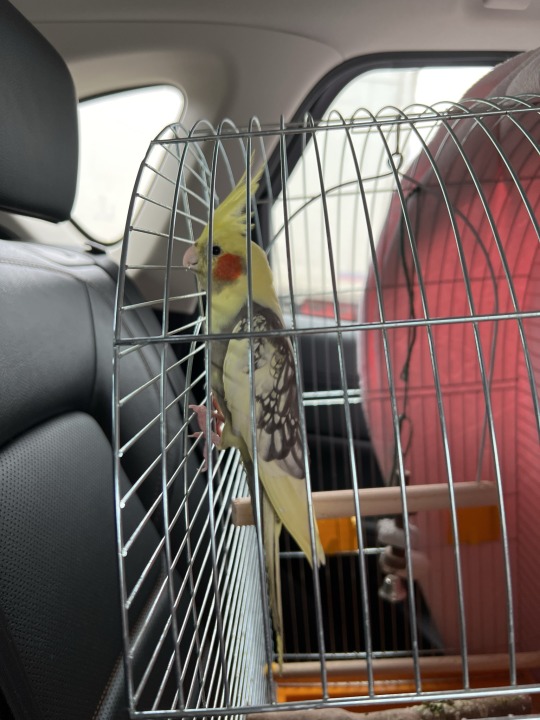
This precious girl was keeping my head cool all the road. She was also scared and irritated, but she was so strong, such an amazing girl. I am so proud of her.
We were heading to my grandparents who lived closer to West Ukraine, so we would be safer. The road that takes usually just 4 hours but that time it took 13 hours. 13 hours of driving exhausted and nerved. We saw soldiers, trucks, jets, how barricades were built, signs were removed.
But we made it. We were lucky. Lucky to be alive, to have family alive and mostly close to West, further from russia. Even though, part of my extended family still was under occupation in Chernihiv region, suffering from such close border with belarus.
When we arrived, we were just silent. Then collected mattresses for shelter, asked grandpa to grab some patrol (we knew that they would definitely destroy reservoirs and literally next day the started doing that), and just fell asleep in something that we arrived in, being so scared.
That day I also cut ties with russian friend who I am shamed to admit having. He was proving me that this is just a military operation, no one would be harmed.
Then, arrived spring that I will never forget but at the same time never remember. I remember 10 people in one floor house. I remember the whistle of rocket that woke us up. I remember sirens. I remember news. I remember losing hope. I remember first photos after deoccupation of Kyiv region. I remember how forgotten friend of my dad suddenly called him saying that his city is fully destroyed, his neighbour right on his eyes was exploded attempting to get into the car and evacuate.
I remember my first mental breakdown. How I was crying in the darkness, but quietly so no one would notice.
We were able to return home three months later. But we are just lucky. Someone would never return. Someone is not even alive to see their home again. Someone’s home is forever destroyed.
I was lucky that I have secured my place at foreign university before war, but my whole family is still in Ukraine.
War is not over at all. 20% of Ukraine is occupied. So many displaced civilians, so many deaths. No one could even count, we do not have any access to bodies. Only way to identify is to deoccupy and find mass graves. No other means. Children are suffering from PTSD even in such a young age. Almost in every city, big or small, you would find graveyards covered in Ukrainian flag, grave of the soldier.
Maybe media does not talk that much of us, but it doesn’t mean that everything is alright. Avdiivka is destroyed, right now operation searching for people under debris of the civilian house after attack is undergoing.
And this is happening all the time.
Who was punished for Olenivka? Who was punished for destruction of Kakhovka Dam? Who was punished for all fully destroyed cities? Who was responsible for all that absolutely atrocious videos torturing Ukrainian soldiers?
Please, remember, Ukraine is still on fire. People are still dying. Soldiers cannot even counterattack because they do not have enough ammo, just for protection. Information war is also waging, sharing all that misinformation, Nazi narratives, russian propaganda.
Remember.
Help.
Share.
russia is a terrorist state.
Glory to Ukraine.
Glory to the Heroes.
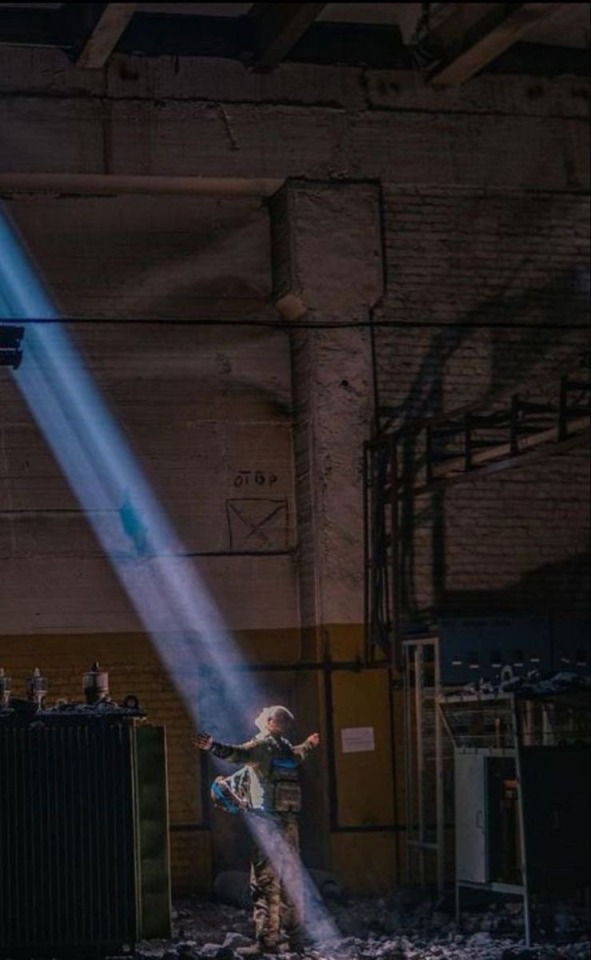
#personal#russia is a terrorist state#russo ukrainian war#ukraine#russia#war crimes#war#glory to ukraine#slava ukraini
266 notes
·
View notes
Text
Events will take place across Ukraine this week to mark Crimean Tatar Flag Day. However, there will be no celebrations in Crimea itself. The Ukrainian peninsula has been under Russian occupation since the spring of 2014, with the indigenous Crimean Tatar population subjected to more than a decade of oppressive policies by the occupying authorities.
Since the beginning of 2025, US-led efforts to broker a compromise peace deal have focused primarily on talk of territorial concessions and geopolitical alignments. However, the plight of the Crimean Tatars is a reminder that steps to safeguard human rights must play a key role in any future settlement.
Since the Russian takeover of Crimea, the peninsula’s sizable Crimean Tatar population has been collectively and systematically persecuted for their perceived opposition to the occupation. For the Crimean Tatars, this mirrors the pain of past experiences with Russian imperialism. Following the Russian conquest of Crimea in the late eighteenth century, the native Crimean Tatar population was subjected to decades of harsh policies by the Russian imperial authorities, leading to a mass exodus.
Worse was to follow. In February 1944, the Soviet authorities carried out the deportation of the entire Crimean Tatar population to Central Asia. More than 200,000 people were forced to abandon their ancestral homeland overnight, with tens of thousands dying in a brutal deportation process and during the initial years of exile.
The deportation of the Crimean Tatars is one of the Soviet Union’s most notorious crimes against humanity. Ukrainian parliamentarians recently appealed to the international community to recognize the deportation as an act of genocide.
22 notes
·
View notes
Text
I'm trying to write these earlier in the day.
I used to put off writing until I finished the smaller, more tractable tasks I set for myself. But by the time I finished the little things, I had no energy for writing.
Now, though, I find I don't have the energy for the little things if I start writing too late in the day. If I start writing late enough, I don't have the energy to exercise.
It's 10:15 a.m. Let's see if I can't finish this with energy to spare.
I.
I write to you from San Francisco, a small town on the Pacific Coast of California, servicing a patchwork of commuter suburbs around what we call the "San Francisco Bay Area."
Back in the 1950s, they called the City "Baghdad by the Bay," after its profound ethnic and religious divides, low-intensity urban warfare, and decrepit public infrastructure.
It's awful. Even here in the Green Zone.
II.
Americans like to say that San Francisco has a "Mediterranean" climate. And it's true that it has a Köppen climate classification of Csb, which we call a "warm-summer Mediterranean climate."
Köppen is a three-tier classification scheme. It designates climates by three-letter labels, with each letter dividing the world into finer and finer categories.
The first Köppen letter divides the world into five parts, each designated by the first five letters of the alphabet: tropical A; arid B; temperate C; cold D; and polar E.
Four of the five letters separate the world into mutually-exclusive categories by mean temperatures in the hottest and coldest months, making for a neat algorithm.
If it's above 10ºC in the coldest month, it's tropical A, else:
If it's above 0ºC in the coldest month, it's temperate C, else:
If it's above 10ºC in the hottest month, it's cold D, else:
If it's below 10ºC in the hottest month, it's polar E.
Arid B is an irregularity. It's based on a precipitation threshold, not mean monthly temperatures. It's also hard to characterize in a single phrase, since it varies with the seasonality of the precipitation. It's higher if the precipitation comes in warm months.
But never mind that. It's not arid in San Francisco. That's part of the problem.
In San Francisco's Csb, C stands for temperate, s for dry summer, and b for warm summer.
Temperate means it averages above 10ºC in the hottest month and between 0ºC and 18ºC in its coldest; dry summer means it gets less than 40 mm of precipitation in its driest month; and warm summer means it averages below 22ºC in the hottest month, but above 10ºC for more than four months each year.
Now, is that Mediterranean? It's not obvious to me that it is. Let's go to the map.
III.
Here's beautiful California, in all its climatic variation, courtesy of our friends at the Köppen-Geiger Explorer:

Let's start in the Los Angeles basin, along the borderlands between the yellow and sienna towards the bottom of the map.

Los Angeles divides into three primary climate regions, which provide a useful key to the California experience.
The coast of western Los Angeles, from Santa Monica down to Palos Verdes, and continuing along the coast of Orange County to the south, is a cold, semi-arid steppe, or Bsk.
It's a climate it shares with Colorado Springs, the Texas panhandle, and a swathe of the Eurasian steppe lands, from Crimea to Volgograd to Inner Mongolia.
South and central Los Angeles, south of the 10, but extending northeast to a frontier in Culver City, Mid-Wilshire, and Koreatown, and south through Anaheim and Garden Grove to Irvine, is a hot, semi-arid steppe, or Bsh.
It's a climate it shares with Gaza, the West Bank of the Jordan, Mosul, the Zagros foothills of Khuzestan, Amritsar, and the northern, or Turkish, part of Cyprus.
North of that, extending from downtown across the mountains into the San Fernando Valley, and east across the river to El Monte, Pomona, and Rancho Cucamonga, is the last part of Los Angeles, the hot-summer Mediterranean, or Csa.
This climate, the climate of Glendale and Pasadena, of Burbank and Sherman Oaks, of Van Nuys, Encino, and Calabasas, is what I think of as the actual Mediterranean climate.
Because it's the climate of the actual Mediterranean.

It's a climate it shares with Athens and Rome, Syracuse and Tunis, Jerusalem and Jaffa, Florence and Naples, but not, significantly, a climate it shares with San Francisco.
Because it's too warm for the city by the Bay.
IV.
Now let's look north, to the Golden Gate.

Here you can see that the Bay Area is, as you might have guessed, a homogeneous and indistinct stain on the map of California.
Does it have semiarid steppe lands? No. Does it have hot summers? No. From the South Bay to the Valley, from the West Side to the East Side, everyone has the same climate, and nobody's very happy.
San Francisco shares a climate with Oakland which shares a climate with Mountain View which shares a climate with Sausalito which shares a climate with San Jose which shares a climate with Berkeley and Richmond. It's a climate that stretches, like an open sore, down to Santa Cruz and Monterey.
It's all the same fucking climate.
It's called, as you may recall, the warm-summer Mediterranean climate, or Csb. Not hot summer. Not the summer of Glendale or Pasadena. No. A warm summer.
How warm is a warm summer? Is that a Mediterranean kind of summer? Is that the kind of summer you get in the south of France or the Greek islands? Well, no.
You know who else has a warm summer?

Fucking Galicia, that's who. The Parnassus Mountains. Mount fucking Lebanon.
You know who else has this fucking climate?

The Pacific fucking Northwest. Because it's cold and wet there. Just like San Francisco.
VI.
San Francisco: It's cold and damp!
I fucking hate it.
69 notes
·
View notes
Text
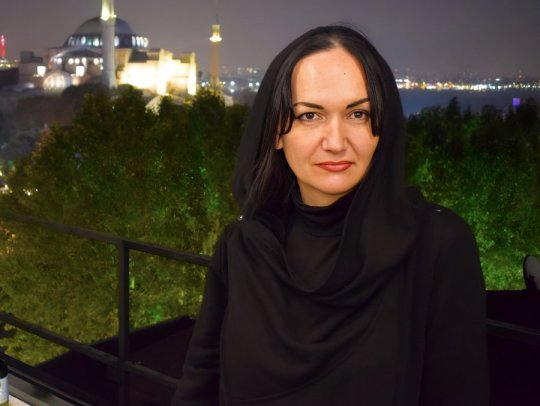
(story taken and machine-translated from the official twitter account of the Mission of the President of Ukraine in the Autonomous Republic of Crimea)
Today's story is about a woman who was detained by the occupiers in the spring of 2022 and illegally sentenced to almost 7 years in prison. Iryna Danylovych is a nurse and citizen journalist.
She was threatened, blackmailed and forced to confess to things she did not do. Now Irina is in a Russian colony, her health is deteriorating due to the lack of quality and timely medical care.
Iryna Danylovych worked as a nurse at the Malachite rehabilitation center in Koktebel, maintained a social media page and several blog columns on the rights of healthcare workers and healthcare issues in the occupied Crimea.
The occupation forces abducted Iryna Danylovych in April 2022. She was returning from a night shift at the hospital when the occupiers searched her house and seized all her appliances, several books and documents.
There was no contact with Irina for more than a week. She was illegally detained by the FSB: she was subjected to psychological pressure, beaten, threatened with death, interrogated on a polygraph, threatened to be "taken to the forest" (ed. - meaning killed and buried in the forest) or "to Mariupol" (once again, killed), fed once a day, and not allowed to go to the restroom.
Eventually, the occupiers informed her relatives that a decision had been made to place her under "administrative arrest", allegedly because "she had transferred unclassified materials to another country". Later, they fabricated a "case" against Irina accusing her of "illegal actions with explosives."
The "proof" was the "discovery" of 200 grams of explosives in Irina's bag. And only on May 11, the lawyer managed to establish that she was in the occupation pre-trial detention center in Simferopol.
The "arrest warrant" was issued by the occupation "court" during a closed court session - without the participation of listeners, journalists, or Irina's relatives.
But the real reason for the detention is different. For covering the problems of the healthcare system, the crimes of the occupiers, as well as for protecting and promoting the rights of healthcare workers in the occupied Crimea.
Iryna was one of the first correspondents of the Crimean Process; she supported Crimean Tatar activists in the "courts"; prepared materials for the editorial office of Inzhyr Media; supported medical activists, recorded violations of rights under occupation.
According to Irina, she was kidnapped, taken to Simferopol and illegally detained in a basement, tortured and starved, and forced to sign a confession under threat of death, having been viciously planted with explosives after the "confession" had been forcibly extracted.
Complete hearing loss in the left ear, deprivation of necessary medications, suffering from headaches and earaches. This is what Iryna is going through now.
Irina was transferred to the Krasnodar Women's Correctional Colony No. 7 in Zelenokumsk. Every day, Irina's health condition deteriorated: in the occupation prisons, she gradually lost hearing in her left ear, developed otitis media, constant headaches and dizziness.
Back in July 2022, the political prisoner reported being beaten by an FSB convoy and psychological pressure exerted on her by Russian security forces. The occupiers also took away the opportunity to read, not returning the collection of poems.
To get medical help, she went on a hunger strike, but stopped it after 10 days, believing the promises of the SIZO administration, but no one has treated her and is not going to, watching the prisoner's health deteriorate.
According to her father, the colony allocates 90 minutes for the distribution of medicines twice a week: on Tuesday and Thursday. During this time, only 20-30 people out of a queue of several hundred prisoners manage to receive them.
"There are periodic fights among the patients for the opportunity to be in the front of the line and receive medicines. Iryna does not participate in this and has been deprived of access to the medicines prescribed by doctors, which we regularly send in parcels, for several months now," her father said.
Despite the illegal actions, torture and pressure, the occupiers failed to break the Ukrainian journalist, she continues to support Ukraine and believe that she will soon return home. "Only in such a strong Ukraine could such a strong you be born," said Iryna's father Bronislav.
Even behind bars, Iryna Danylovych continues to resist the occupiers and support Ukraine. The song "I am free!" performed by her is a symbol of disobedience and struggle, which the occupiers do not like, and the tattoo on her body that reads "Freedom is our religion" is her life's credo.
#human rights#ukraine#russia#journalist#crimea#war in ukraine#you know a woman being kidnapped and tortured as a punishment for speaking up about issues in the healthcare system#sounds like exactly something western leftists would be supporsed to care about#but alas our agressor is russia and they are allowed to do that because dostaevsky and chaikovsky#and one can't twist this story to somehow make it about usa#very sad
67 notes
·
View notes
Text
instagram
IWTV S2 Musings - Romania BTS deets! (Pt2: Tentative Timeline Revisions again)
So, a few days ago I stumbled upon Carol Cutshall's Instagram posts about Daciana, Emilia, etc, which I discussed in Pt1. I didn't have the brain capacity, time, space or energy to also address this other post she made even earlier, back in July, which also includes Louis & Claudia's Eastern European itinerary!

The text is SMALL AF so I can barely read anything, but already I see major discrepancies:

Everything up until 1944 makes sense AFAIK, it's not contradicting any of the dates mentioned in 2x1 which I laid out here (x x):
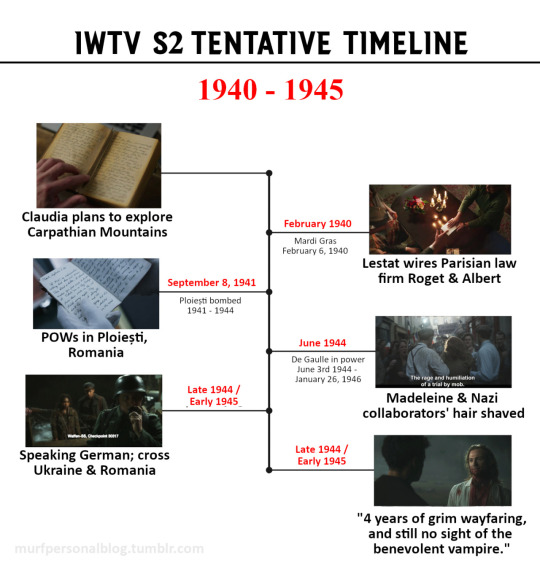
I REALLY wish we could read that list in full, cuz I had wondered what was going on with the Nazis calling them "Black Ukranians;" and if they were trying to enter OR leave Ukraine.
Funny enough, AMC seems to have forgotten that in 1x4 Claudia's diary also says they were in Romania on September 8, 1941--not that that means they couldn't've been there; just that the itinerary doesn't mention it (was that a mistake/oversight, or was the itinerary made before 1x4 was written/aired? 🤔).

So yeah, I'm fine with the 1941-1944 dates.
So here's another revised timeline for anyone interested:
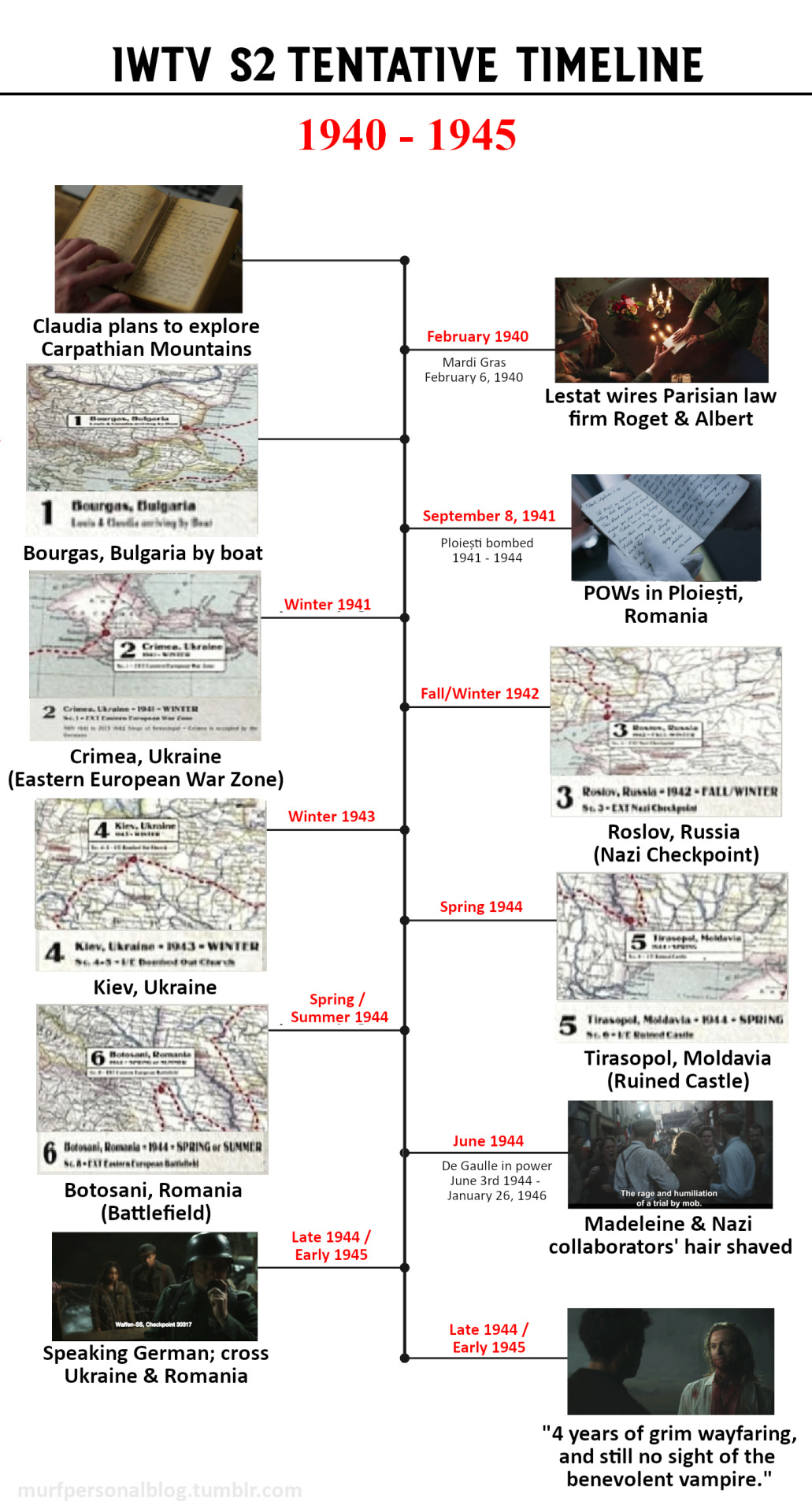
(EDIT: I dunno if we should consider this (old? obsolete?) itinerary as CANON, since the show itself never mentions them in any of these places/dates--this is a truly meta revision; so I'm keeping my original timeline as-is until we're told differently.)
Apparently, the "circuitous routes around the mad army" Louis said they traveled took them from:
Bouras, Bulgaria: they arrived via boat from Greece (so they probably crossed the Mediterranean via the Straits of Gibraltar, and bypassed Western Europe entirely)
Winter 1941 - Crimea, Ukraine: went northeast, crossing the Black Sea
Fall/Winter 1942 - Roslov, Russia: northeast
Winter 1943 - Kiev, Ukraine: northwest. Something about a church, but I can't read the rest *squints.*
Spring 1944 - Tiraspol, Moldavia: was the "ruined castle" supposed to be Cezare Romulo's!? that's super interesting if so, cuz that means at some point he lived in Romania near Daciana, to have killed that circus troupe IN SIBIU (Romania) & stolen their show bear, LOL. Why did he move to Moldavia? My headcanon says he wanted independence (like the IRL Moldavans), to break away from the Romanians/covens in the west and do his own thing out east--Daciana said "he was always a droll one." 👀 Vampire beef!? 😂🤣 Regardless, this might support my suspicion that although AMC filmed Cezare's castle at Tocnik, that was just for convenience's sake--we're probably not supposed to take any contextual clues from the IRL castle, the way I did for Daciana. So Cezare could be from ANYWHERE, really. Very cool!
Spring/Summer 1944 - Botosani, Romania: northwest
But it's as soon as we hit 1945 that a few snags appear.

While it's very cool that we now have an exact location for where Emilia's factory & Daciana's home would've been located (Biertan, Romania--so I was right that AMC was pulling inspo from Biertan!), there's a BIG problem:
Louis & Claudia couldn't've been in/entering Biertan, Romania in Fall 1945, and in France's Saint-Jean Lespinasse in Winter 1945, based on what we saw in the episode itself--namely:

In 2x1 Lou & Claudia were on the convoy delivering the Venus de Milo to Paris, which was already back in the Louvre by July 2, 1945. It had been hidden away with the rest of the Louvre's art for safekeeping during WWII in Château de Valençay (x x)--which is in a totally different commune from the Saint-Jean commune (which is much farther south). But the truck they were on would've still been IN France during the Spring/Summer 1945, NOT way out in Eastern Europe during the Fall/Winter 1945.
(What's interesting is that a famous art piece was indeed (temporarily) hidden in Saint-Jean, at the Château de Montal, but it wasn't Venus de Milo. It was THE Mona Lisa, which was also returned to the Louvre even earlier, on June 16, 1945.)
So there must've been a change at some point where the writers decided to add Venus and just ignore this itinerary--they even make a point to have Louis reunite with Venus later on in 2x4:


So it's not as if it was just an accident that Venus kept showing up in post-war Paris--just as Louis was starting a new romance with Armand under THE Goddess of Love/Lust's auspices.


So this just REALLY make me wonder WHEN that itinerary was mapped out, wrt to what we actually got on screen and in the S2 transcript (and ofc whatever was going on with the writer's strike); cuz it just doesn't make chronological sense to hold those last 2 dates at face value; they're just wrong. :\
*sigh* This is equal parts fun & frustrating; AMC, have mercy~! 😅
#interview with the vampire#iwtv tvc metas#the vampire daciana#loumand#justice for claudia#i hate math#europe#read a dang history book
9 notes
·
View notes
Text
“If tomorrow Russia goes into Crimea, no one will raise an eyebrow. Besides… promises, no one ever planned to give Ukraine any guarantees.” Leonid Kuchma
It is no accident that Kuchma mentioned the possible invasion of Crimea in 1994, not Donbas or any other region of Ukraine. Already in the spring of 1994, Russia seriously attempted to invade Crimea for the first time, just seven months before signing the Budapest Memorandum.
#ukraine#nuclear disarmament#clinton administration#budapest memorandum#crimea#1994#history#politics#background information
75 notes
·
View notes
Text
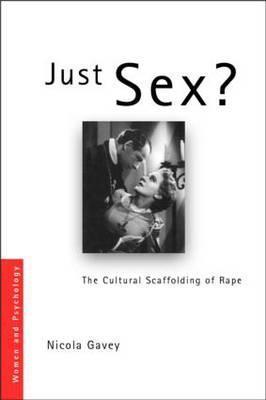
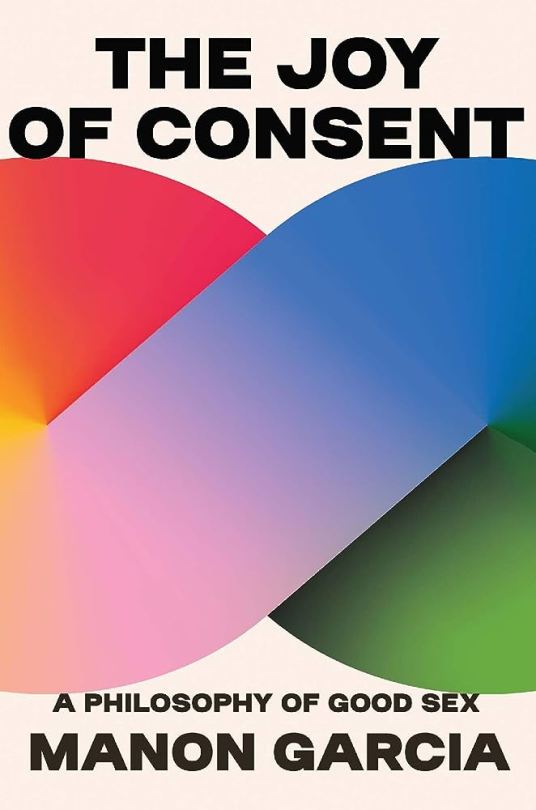

Spring 2025: favorite books I read
Just sex?: the cultural scaffolding of rape (Nicola Gavey, 2005)
"The past two decades have witnessed a significant shift in how rape is understood in Western societies.
This shift in perception has revealed the startling frequency of occurrences of date rape, obscuring the divide between rape and what was once just sex.
Just Sex? combines an overview of the existing literature with an analysis of recent research to examine the psychological and cultural implications of this new epidemic."
excerpts: tagged/just sex
—
The joy of consent: a philosophy of good sex (Manon Garcia, 2023)
"In The Joy of Consent, French philosopher Manon Garcia upends the assumptions that underlie this very American debate, reframing consent as an ally of pleasure rather than a legalistic killjoy. In doing so, she rejects conventional wisdom on all sides.
As a legal norm, consent can prove consent alone doesn’t make sex licit―adults engaged in BDSM are morally and legally suspect even when they consent.
And nonconsensual sex is not, as many activists insist, always rape. People often agree to sex because it is easier than the alternative, Garcia argues, challenging the simplistic equation between consent and noncoercion."
excerpts: tagged/the joy of consent
—
Prisoners of geography: ten maps that tell you everything you need to know about global politics (Tim Marshall, 2015)
"Yes, to follow world events you need to understand people, ideas and movements - but if you don't know geography, you'll never have the full picture.
If you've ever wondered why Putin is so obsessed with Crimea, why the USA was destined to become a global superpower, or why China's power base continues to expand ever outwards, the answers are all here."
excerpts: tagged/prisoners of geography
#2025#2025 book#book#just sex#nicola gavey#the joy of consent#manon garcia#prisoners of geography#tim marshall
5 notes
·
View notes
Text
Spring air. A little downy. See those lindens lining the street? Black boughs covered with wet green spangles. All the trees in the world are journeying somewhere. Perpetual pilgrimage. Remember, when we were on our way here, to this city, the trees traveling past the windows of our railroad car? Remember the twelve poplars conferring about how to cross the river? Earlier, still, in the Crimea, I once saw a cypress bending over an almond tree in bloom. Once upon a time the cypress had been a big, tall chimney sweep with a brush on a wire and a ladder under his arm. Head over heels in love, poor fellow, with a little laundry maid, pink as almond petals. Now they have met at last, and are on their way somewhere together. Her pink apron balloons in the breeze; he bends toward her timidly, as if still worried he might get some soot on her
Vladimir Nabokov, from "Gods", in The Stories of Vladimir Nabokov
23 notes
·
View notes
Text

Zinaida Serebriakova (Russia 1884-1967 France) Весна в Крыму - Spring in Crimea (1914) mixed media on paper 47 x 61 cm
50 notes
·
View notes
Note
I’m not sure if its late for questions but I suppose it can’t hurt to try. Where are typical places to go on vacation for Russians? For example, Americans often go to visit islands in the Carribean, southern states like Florida, and places in South America like Mexico. I’ve heard Australians often visit Indonesia. So what are popular vacation destinations for Russians? Is vacationing common or is it a thing only rich people really do? Like my family has only been on a couple actual vacations, mostly we go camping locally because its much cheaper.
Common domestic vacation destinations are the South of Russia (it's a small area and it's always crowded) - Sochi, Anapa, all towns and villages along the Black Sea coast and Azov sea coast. Kislovodsk and the whole Mineral Springs area - known for, you guessed it, its mineral springs. Kaliningrad - a small piece of Europe jammed between Lithuania and Poland where you can go without a foreign passport. Definitely Crimea - a top holiday destination throughout the years, so much coastline for the vitamin D deprived Russians.
Of out-of-country destinations, I can name Turkey (often cheaper than Sochi), Abkhazia. For the Asian part of Russia, I hear they go to China and Korea a lot as it's cheaper than flying to Europe/Moscow.
Taking vacations is a privilege I'd say. A lot of people can't afford it. For many the best possible destination is their grandparents' village. Still, a lot of people try to take at least one vacation in the summer and make some memories. 30% of Russians have a valid foreign passport (for travelling out of the country), so that kind of travel is way less common.
55 notes
·
View notes
Text

Sukhoi Superjet 100-95 Azimuth Airlines
Registration: RA-89179 Named: Tobol Type: 100-95B Engines: 2 × SaM146 Serial Number: 95182 First flight: Feb 6, 2019
In the spring of 2017, a new company emerged in Russia’s aviation sector—Azimuth Airlines. Based in the south of the country, this carrier set an ambitious goal at the outset: to connect regions often overshadowed by larger airlines. Azimuth established its primary bases at Platov Airport (Rostov-on-Don) and Pashkovsky Airport (Krasnodar), with an additional hub in Mineralnye Vody. These cities served as the starting points for a route network that spans southern and central Russia, as well as select international destinations.
From the beginning, Azimuth focused on routes linking smaller cities with major hubs. By 2025, the airline was serving 162 destinations, underscoring its commitment to making air travel more accessible. Domestically, its aircraft fly to cities such as Kazan, Yekaterinburg, Samara, Volgograd, and over forty other routes, fostering economic and social ties across Russia’s vast expanse. Internationally, Azimuth operates flights to Tbilisi, Tel Aviv, Almaty, and about a dozen other destinations. A significant milestone came in 2020 with the launch of regular flights to Crimea, reflecting demand for this destination.
A distinctive feature of Azimuth is its fleet, composed entirely of Sukhoi Superjet 100 aircraft. By 2025, the airline operated 19 of these jets, a choice driven by both practicality and support for domestic aviation manufacturing. The Sukhoi Superjet 100 is well-suited for the regional routes that form the backbone of Azimuth’s network. Each aircraft is named after a Russian river, symbolizing a connection to the country’s geography and history. For example, aircraft RA-89179 is named after the Siberian river Tobol, evoking the diversity of Russia’s landscapes. Thus, Azimuth successfully demonstrates how a regional carrier helps bridge distances – both geographic and cultural.
Poster for Aviators aviaposter.com
3 notes
·
View notes
Text
People in Washington have belatedly been taking notice that Ukraine, a country with not much of a navy, has chased Putin's fleet out of much of the Black Sea. Things are relatively close to normal for Ukrainian grain exports which use shipping on that sea.
In the Black Sea, Ukraine forced the Russian fleet to retreat from the historic headquarters of Sevastopol in Crimea after hitting ships and key buildings repeatedly with drones and missiles. That was a personal blow to Russian President Vladimir Putin, who lauded the Russian annexation of Crimea in 2014. The maritime success also opened a corridor for Ukraine to move grain shipments in defiance of Russia’s decision last summer to cancel an export deal, an economic and symbolic victory in the war. “Ukraine won in the Black Sea,” Ukrainian President Volodymyr Zelensky said during a trip to Washington last month. Zelensky has made the Black Sea victories a central part of his pitch to Western allies and supporters in the past couple of months — a sign of Ukrainian strength after the ground counteroffensive launched in June largely failed, delivering a stalemate on the frontlines of eastern Ukraine. “This is huge,” said Olga Lautman, nonresident senior fellow at the Center for European Policy Analysis. “They literally shifted the balance in the Black Sea. … Besides practically reopening the Black Sea, they’ve taken out Russia’s navy and pushed them out for the most part. And the attacks continue.” Ukraine has maintained an edge in the waters of the Black Sea since the war began in February 2022 — and Kyiv does not have a naval force, let alone one the size of the Russian fleet. In the early days of the war, Ukraine secured its hold on Odesa, a Black Sea port city in southern Ukraine, and sunk the Russian flagship the Moskva. Ukrainian troops also liberated Snake Island, where defiant Ukrainian troops emerged famous for cursing at a Russian warship, in spring 2022. In August, Ukraine stepped up attacks on the Black Sea fleet in Sevastopol, a hub for the Russian navy since Moscow annexed Crimea, but which has historical importance for Russia going back to the 1700s. In September, one strike damaged the headquarters of the Russian navy in Sevastopol. That month also saw Ukrainian special forces retake oil platforms in the Black Sea from Russia years after Moscow first seized them. For the next two months, Ukraine kept assaulting Russian ships, leading to a full Russian naval retreat from Sevastopol and western Crimea. After the fall attacks, Zelensky hailed Ukrainian forces for “pushing the Russian navy out to the eastern part of the Black Sea,” saying they “totally changed” the situation in the maritime domain. “Russia can no longer use our sea to expand its aggression to other parts of the world,” Zelensky said in an Oct. 31 address, “Ukraine’s success in the battle for the Black Sea will go down in history books, although it’s not being discussed much today.”
It's become increasingly difficult for Russia to resupply its positions by sea. Last month Ukraine sunk a Russian ship loaded to the brim with munitions. This took place in Feodosia in occupied eastern Crimea which is only 100 km by road from Kerch where Ukraine damaged a bridge which connects occupied Ukraine to Russia.
Despite heavy and embarrassing losses, Putin will not give up his desire to conquer Ukraine unless he is forced to. Ukraine has been holding its own, but it needs help obtaining weapons and equipment. The GOP House of Representatives is holding up aid to Ukraine for its own political purposes. We need to contact our representatives and tell them to quit acting like Putin's agents on Capitol Hill.
Find out who your House member is.
Find Your Representative
Then contact him or her using the contact information given at the site. With Republicans, invoke the name of Ronald Reagan and insist that they quit supporting measures which help the Evil Empire. Be firm but polite.
#invasion of ukraine#naval power#the black sea#russian navy#putin's boats are sleeping with the fishes#vladimir putin#sevastopol#crimea#olga lautman#volodymyr zelenskyy#aid to ukraine#us house of representatives#contact your representative#stand with ukraine#черное море#российский флот спит с рыбами#украина правь волнами#россия#владимир путин#путин хуйло#путлер#союз постсоветских клептократических ватников#руки прочь от украины!#геть з україни#вторгнення оркостану в україну#україна переможе#разом – до перемоги#володимир зеленський#слава україні!#героям слава!
34 notes
·
View notes
Text
With Donald Trump set to return to the White House in the coming weeks, speculation is mounting that Ukraine and Russia may soon begin serious peace negotiations. However, there is very little sign that Russian President Vladimir Putin is ready to abandon his goal of subjugating Ukraine. Instead, the peace formula currently being promoted by Kremlin officials would be more likely to pave the way for the next stage in Putin’s campaign to erase Ukrainian independence entirely.
Ever since the abortive peace talks of spring 2022 during the initial phase of the full-scale invasion, Russia has insisted that any peace deal must include territorial concessions from Kyiv along with Ukrainian neutrality and the country’s comprehensive demilitarization. Putin himself spelled out Russia’s territorial expectations in June 2024, demanding that Kyiv cede four partially occupied Ukrainian provinces, none of which are fully under Russian control. This would mean handing over large amounts of unoccupied Ukrainian territory including the city of Zaporizhzhia with a population of around three quarters of a million people.
On numerous other occasions, Putin and his Kremlin colleagues have reaffirmed their conditions. These include Ukraine officially giving up its pursuit of NATO membership and agreeing not to enter into any military alliances with Western powers. Kyiv is also expected to accept extensive limitations on the size of its armed forces and on the kinds of weapons systems it is allowed to possess.
These proposals are not a recipe for a sustainable settlement. On the contrary, Putin’s peace plan is in fact a call for Kyiv’s complete capitulation. Moscow’s demands are deliberately designed to leave Ukraine internationally isolated and unable to defend itself. If these terms are imposed on the Ukrainian authorities, there can be little doubt that Putin would use any subsequent pause in hostilities to rearm before renewing the war in the coming years.
Russia’s true intentions can be seen in its insistence that Ukraine abandon efforts to join NATO and accept permanent geopolitical neutrality. Moscow claims this is essential in order to safeguard Russian national security, but Putin’s own actions suggest otherwise.
When neighboring Finland announced plans to join NATO in 2022, Putin made no effort to block the process and announced that Russia had “no problems” with Finnish accession. He then went even further, withdrawing most Russian troops from the border with Finland. Clearly, Putin does not view NATO as a security threat to Russia itself. Instead, he sees the alliance as a potential obstacle to his own expansionist ambitions in Ukraine.
Russian demands for a neutral and demilitarized Ukraine should be equally unacceptable in Kyiv and among Ukraine’s Western partners. Agreeing to the Kremlin’s conditions would mean leaving millions of Ukrainians at Putin’s mercy, while also emboldening Moscow and inviting more Russian aggression. From Chechnya and Georgia to Crimea and Syria, there is ample evidence from the past two decades that each successive failure to hold Russia accountable only encourages fresh escalations.
The West’s misguided efforts to appease Putin have already led to the largest and bloodiest European war since World War II. Any further attempts at appeasement will have similarly disastrous consequences for the future stability and security of Europe. Indeed, senior European officials are now warning that a military confrontation with Moscow is becoming more likely, with German spy chief Bruno Kahl recently predicting that Russia may seek to test NATO before the end of the current decade.
While Russia is pushing for a disarmed and neutral Ukraine, Ukrainian officials are preparing for possible peace talks by prioritizing the need for credible security guarantees. In recent months, Ukrainian President Volodymyr Zelenskyy has signaled the country’s readiness to temporarily compromise on territorial integrity in order to move forward toward a viable peace. At the same time, officials in Kyiv have underlined that there is no room for any similar compromises on the issue of security guarantees.
Ukraine’s objective remains NATO membership, which is seen in Kyiv as the only credible long-term guarantee of the country’s security and sovereignty. However, key members of the alliance including the United States and Germany remain deeply reluctant to embrace Ukraine’s NATO aspirations.
With their country’s pathway to NATO accession likely to be extremely politically challenging, Ukrainian officials are also exploring the possibility of bilateral security guarantees. In a recent interview with US podcaster Lex Fridman, Zelenskyy said security guarantees for Kyiv to end Russia’s war would only be effective if the United States provides them. He was also scathing of the 1994 Budapest Memorandum, which saw Ukraine surrender the world’s third-largest nuclear arsenal in exchange for security assurances from Russia, the US, and the UK that ultimately proved worthless.
Given the diametrically opposed positions of Russia and Ukraine on the issue of NATO membership, it seems certain that security guarantees will be the most problematic point during any forthcoming negotiations to end the war. Can Western leaders come up with a credible security formula that will safeguard Ukrainian statehood and deter further Russian aggression? Unless they do so, Ukraine’s prospects will be grim and the rest of Europe will face years of costly confrontation with a resurgent Russia.
12 notes
·
View notes
Text
I keep thinking how through all my life something horrible was always happening. And I'm not even talking to me personally, just… Around me.
The fall of USSR, the Russian 90s, Chechen Wars, 9/11, Kursk submarine, Nord-Ost play, the invasion of Georgia, the annexation of Crimea, war in Ukraine. Now Navalny is dead.
And yet the sun comes up every morning. And yet the birds are coming back to welcome the spring.
15 notes
·
View notes